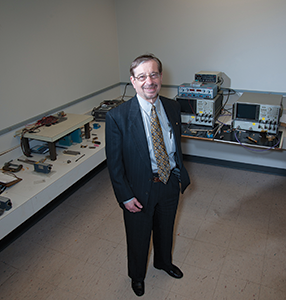With a foot in both academia and industry, Katz propels students into life after college
In his 40 years at the College, Professor Allen Katz, an internationally recognized expert in the satellite and microwave communications industries with his own company, has mentored nearly 2,000 students. Many have worked in his lab, presented papers with him at conferences, and gone on to graduate school and positions in industry or started their own businesses.


When Allen Katz co-founded the Trenton Computer Festival in 1976—the world’s first personal computer show—no one had heard of the World Wide Web and students were still typing papers on manual typewriters. The inaugural event made the front page of The New York Times and a Playboy reporter covered it. “Having a computer was like a new toy,” says Katz, a professor of electrical/computer engineering.
Attendance grew over the years, peaking around 1989—to some 14,000 attendees when Bill Gates was the keynote speaker. This past April, the festival marked its 36th year—and Katz remains a driving force behind it.
While festivalgoers still come for good deals, education has always been the festival’s mission and has become a larger component of the show. Concerned with developing the next generation of individuals adept at science, technology, engineering, and math (STEM), Katz says, “We don’t see the younger people getting involved” in technology and in organizations like computer and robotics clubs. That’s one reason the festival committee brought a new conference on topics in K–12 STEM education to the show this year—to foster discussion and encourage interest in those subjects.
That commitment to developing the next generation’s entrepreneurial spirit and interest in science and technology is a hallmark of the longtime TCNJ professor. In his 40 years at the College, Katz, an internationally recognized expert in the satellite and microwave communications industries with his own company, has mentored nearly 2,000 students. Many have worked in his lab, presented papers with him at conferences, and gone on to graduate school and positions in industry or started their own businesses.
With a foot in both academia and industry, Katz has provided his students with connections to real-world applications of classroom knowledge. His students get excited learning about theories, because they see how theory applies to actual devices or designs, says Steve O’Brien, assistant professor in the School of Engineering’s technological studies department. “You can learn from a book or [you can learn from] someone with a lot of experience—that’s Al,” says O’Brien.
Students are highly involved in Katz’s research. TCNJ students have greater opportunity to do more advanced research than students typically do in larger universities, observes Katz.
For their senior project, two of Katz’s students, Chris Brinton ’11 and Matthew Wharton ’11, designed a down converter with a gain equalizer that takes signals from a satellite and sends them out over a photonic network. That project is funded by Alcatel-Lucent, where Brinton (who is headed to Princeton University in the fall to begin graduate studies) worked last summer. Another student, Thomas DeVito ’11, is working under a grant Katz received from the New Jersey Department of Transportation to find methods to locate conduits installed underground that hold fiber-optic cables.
Katz founded his own Hamilton, New Jersey-based company, Linearizer Technology, Inc., with two TCNJ students in 1991. Since then its engineering staff has been made up primarily of TCNJ alumni. A subfield of the satellite industry, linearizers are devices that correct for signal distortions when information is transmitted in communication systems. Katz’s company makes linearizers primarily for the ground segment of satellite systems and for the space industry.
Roger Dorval ’91, the vice president of engineering at Linearizer Technology, Inc. first got involved in linearization with Katz at TCNJ. His professor helped him secure an internship at NJIT and land a research grant that led to his first job at GE Astro Space. Dorval has been with Katz’s company since 1993 and is one of the partners.
“He really cares” about his students, says Dorval. “He treats them all like they are his [own] children.” What’s more, adds Dorval, “he’s an icon in our [satellite] industry,” having published numerous papers and been awarded patents.
With his colleagues, Katz was key in shaping the School of Engineering at TCNJ, says Dean of the School of Engineering Steven Schreiner. After earning his doctorate in electrical engineering at NJIT, Katz arrived at the College in 1971, just as technology degree programs were begun. The quality and rigor of these programs ultimately led to the creation of the multiple engineering degree programs offered today. From 1973 to 1989, Katz served as chair of the engineering department while he and his colleagues worked to develop national recognition for the program. Today, TCNJ offers six engineering degrees, and the number of students majoring in engineering has doubled in the last decade to more than 500, says Schreiner.
“Without the dedication of Dr. Katz and his colleagues, there wouldn’t be a School of Engineering today. He is a cornerstone in the foundation of who we are,” says Schreiner.
With a company to run, classes to teach, papers to publish, and a yearly festival to organize, among his many obligations, Katz seems to be constantly on the go. “Dr. Katz rarely stops working during his waking hours,” says Dorval. “During a lunch when we are all ready to relax and unwind, he will be working a new design or solving a problem on the back of a napkin.” Because of his jam-packed schedule, he frequently literally runs out the door to his next appointment—with a cell phone in hand calling the person he just left to finish up their conversation before his next meeting.
He’s not slowing down any time soon.
Posted on June 6, 2011

